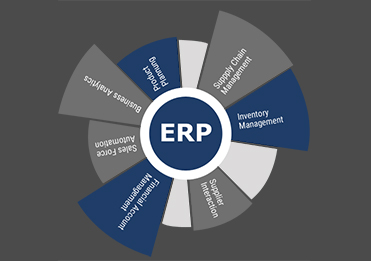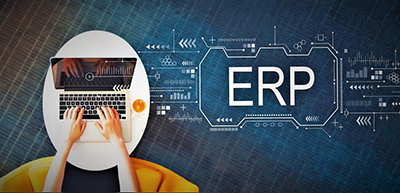ENTERPRISE RESOURCE PLANNING
Enterprise Resource Planning (ERP) is a software system that integrates all aspects of a company’s operations, such as finance, human resources, manufacturing, and supply chain management, into a single, comprehensive database. The system allows for the automation of business processes, streamlining of operations, and real-time data analytics to make informed decisions. ERP is designed to improve efficiency, reduce costs, and enhance productivity across all functional areas of an organisation.


ERP applications allow the different departments to communicate and share information more easily with the rest of the company. It collects information about the activity and state of different divisions, making this information available to other parts, where it can be used productively.
ERP applications can help a corporation become more self-aware by linking information about production, finance, distribution, and human resources together. Because it connects different technologies used by each part of a business, an ERP application can eliminate costly duplicates and incompatible technology. The process often integrates accounts payable, stock control systems, order-monitoring systems, and customer databases into one system.
An Enterprise Resource Planning System to Transform, Integrate and Scale your Business
Enterprise Resource Planning (ERP) is a comprehensive solution that is designed to help organisations manage and automate various business processes across different functional areas such as finance, human resources, inventory and supply chain management, manufacturing, customer relationship management (CRM), and many more.
ERP systems integrate and streamline business operations, providing real-time visibility into company-wide data and facilitating decision-making processes. ERP software solutions are scalable and customisable, which means they can be tailored to meet the specific needs of an organisation, irrespective of its size and complexity. By leveraging the power of ERP systems, businesses can enhance their operational efficiency, improve collaboration, reduce costs, and increase profitability.
What Does ERP Do?
Features
A good ERP system should have a wide range of features that support the various functions and processes of an organisation. Some of the key features that a good ERP system should have are:
- Integration: A good ERP system should be able to integrate with all the systems and applications used in an organisation, including accounting, CRM, inventory management, and HR.
- Customisation: A good ERP system should be highly customisable so that it can be tailored to meet the unique needs of an organisation.
- Scalability: A good ERP system should be scalable, meaning it can grow and expand as the organisation grows and expands.
- User-friendly interface: A good ERP system should have a user-friendly interface that is easy to navigate and use.
- Mobility: A good ERP system should allow users to access the system from anywhere using mobile devices.
- Security: A good ERP system should have strong security features to protect sensitive data and prevent unauthorised access.
- Analytics and reporting: A good ERP system should provide powerful analytics and reporting tools that can help organisations make informed decisions based on real-time data.
- Flexibility: A good ERP system should be flexible enough to adapt to changes in the business environment and accommodate new technologies and processes.
- Support: A good ERP system should have a robust support system in place, including user training, technical support, and ongoing maintenance.
By having these features, a good ERP system can provide organisations with the tools they need to manage their business processes efficiently, reduce costs, and improve productivity.
